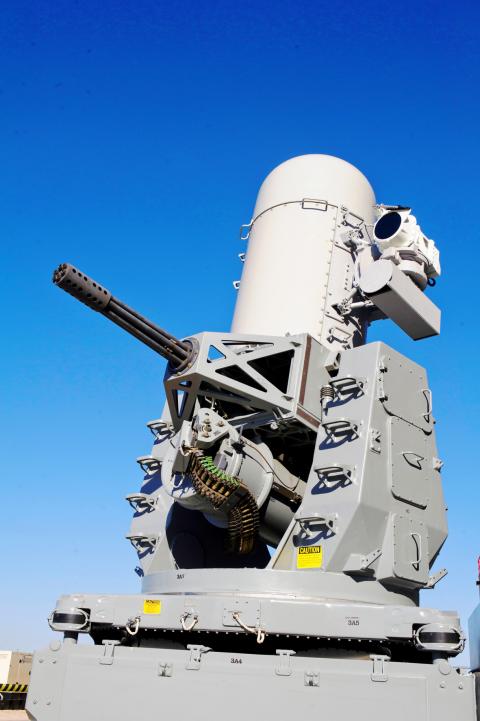Taiwan has accepted part of an arms deal package offered by the US that includes 13 sets of Phalanx close-in weapons systems (CIWS) and other equipment that will cost NT$9 billion (US$286.6 million), Ministry of National Defense sources said yesterday.
The US in December last year extended a letter of offer and acceptance to Taiwan for an arms package costing about US$1.83 billion.
The package included two decommissioned FFG-7 Oliver Hazard Perry-class guided missile frigates, 36 AAV-7 amphibious assault vehicles, 13 MK 15 Phalanx Block 1B ship defense CIWS and upgrade kits, ammunition and support, 250 Block I-92F MANPAD Stinger missiles and other equipment.

Screen grab from the Raytheon Co Web site
Taiwan agreed to buy the frigates in March, the AAV-7 vehicles in May and the Phalanx CIWS last month, the source said.
The CIWS is considered standard equipment on all surface combat ships, the source said, adding that the ministry has deployed the systems in mountainous areas to enhance security at missile bases.
Prior to the signing of the offer last month, the navy had only one MK 15 Block 1B CIWS system on one of its Kidd-class destroyers, the source said.
The MK 15 system is more advanced than the Phalanx systems currently in the Taiwanese arsenal, with the addition of visible light/infrared targeting systems and the ability to switch to manual mode, increasing a surface combat ship’s counterstrike abilities, the source said.
Ministry officials said that delivery of the new systems is expected to be a drawn-out process, with the navy not likely to receive the last batch until June 2024.

SECURITY: As China is ‘reshaping’ Hong Kong’s population, Taiwan must raise the eligibility threshold for applications from Hong Kongers, Chiu Chui-cheng said When Hong Kong and Macau citizens apply for residency in Taiwan, it would be under a new category that includes a “national security observation period,” Mainland Affairs Council (MAC) Minister Chiu Chui-cheng (邱垂正) said yesterday. President William Lai (賴清德) on March 13 announced 17 strategies to counter China’s aggression toward Taiwan, including incorporating national security considerations into the review process for residency applications from Hong Kong and Macau citizens. The situation in Hong Kong is constantly changing, Chiu said to media yesterday on the sidelines of the Taipei Technology Run hosted by the Taipei Neihu Technology Park Development Association. With

‘FORM OF PROTEST’: The German Institute Taipei said it was ‘shocked’ to see Nazi symbolism used in connection with political aims as it condemned the incident Sung Chien-liang (宋建樑), who led efforts to recall Democratic Progressive Party (DPP) Legislator Lee Kun-cheng (李坤城), was released on bail of NT$80,000 yesterday amid an outcry over a Nazi armband he wore to questioning the night before. Sung arrived at the New Taipei City District Prosecutors’ Office for questioning in a recall petition forgery case on Tuesday night wearing a red armband bearing a swastika, carrying a copy of Adolf Hitler’s Mein Kampf and giving a Nazi salute. Sung left the building at 1:15am without the armband and apparently covering the book with a coat. This is a serious international scandal and Chinese

COUNTERINTELLIGENCE TRAINING: The ministry said 87.5 percent of the apprehended Chinese agents were reported by service members they tried to lure into becoming spies Taiwanese organized crime, illegal money lenders, temples and civic groups are complicit in Beijing’s infiltration of the armed forces, the Ministry of National Defense (MND) said in a report yesterday. Retired service members who had been turned to Beijing’s cause mainly relied on those channels to infiltrate the Taiwanese military, according to the report to be submitted to lawmakers ahead of tomorrow’s hearing on Chinese espionage in the military. Chinese intelligence typically used blackmail, Internet-based communications, bribery or debts to loan sharks to leverage active service personnel to do its bidding, it said. China’s main goals are to collect intelligence, and develop a

A US Marine Corps regiment equipped with Naval Strike Missiles (NSM) is set to participate in the upcoming Balikatan 25 exercise in the Luzon Strait, marking the system’s first-ever deployment in the Philippines. US and Philippine officials have separately confirmed that the Navy Marine Expeditionary Ship Interdiction System (NMESIS) — the mobile launch platform for the Naval Strike Missile — would take part in the joint exercise. The missiles are being deployed to “a strategic first island chain chokepoint” in the waters between Taiwan proper and the Philippines, US-based Naval News reported. “The Luzon Strait and Bashi Channel represent a critical access